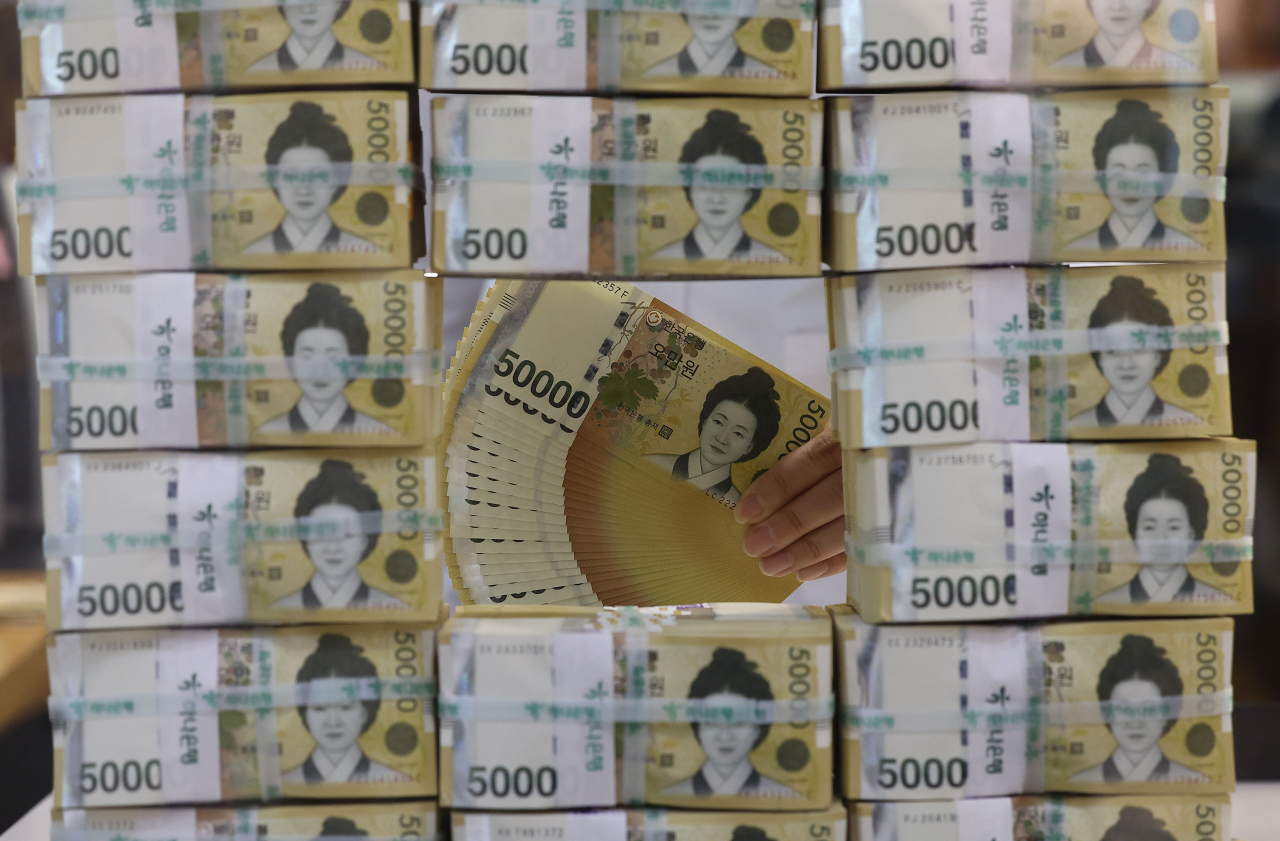 |
50,000-won bills are being laid out at the Hana Bank's headquarters in central Seoul, Jan. 15. (Yonhap) |
The Korean government saw its tax revenue fall by more than 50 trillion won ($37.5 billion) in 2023 compared with a year earlier due to a slowdown in the chip industry and a contraction in the property market, the Finance Ministry said Wednesday.
Korea’s tax revenue totaled 344.1 trillion won for 2023, down 13.1 percent or 51.9 trillion won, from the previous year's 395.9 trillion won, according to preliminary figures suggested by the Ministry of Economy and Finance. It was the first time for tax revenue to mark a drop of over 50 trillion won on-year.
It was also 56.4 trillion won short of the budget plan of 400.5 trillion won drawn up for last year, marking a difference of minus 14.1 percent.
It is the third-straight year for the government's tax revenue evaluation to have missed the mark with a double-digit error rate. The error rate stood at 21.7 percent in 2021 and 15.3 percent in 2022 with a surplus in tax revenue.
Last year's tax revenue was, however, larger than the revised estimate of 341.4 trillion won suggested in September, by 2.7 trillion won, or 0.8 percent. Amid the series of tax deficits, the government announced a revised estimate in September for the first time.
“The tax shortfall came mainly due to weak corporate earnings and a slump in the capital market," the ministry said.
Weak corporate earnings in 2022 and the first half of 2023 brought down corporate taxes prepaid to August, leading to a 23.2 trillion won-on-year decrease in corporate tax.
The operating profit of listed companies dropped by 70.4 percent from 63.6 trillion won in the first half of 2022 to 18.8 trillion won in the same period of 2023.
This drop was partly due to how the production of semiconductors, the biggest export item for Korea, showed a sharp decline last year, resulting in weak earnings for local tech giants such as Samsung Electronics and SK hynix.
The capital gains tax revenue dropped by 14.7 trillion won on-year following the slowdown in the property market. According to the Finance Ministry, transactions of lands and housing last year dropped by 32.4 percent and 7.1 percent on-year, respectively.
Value-added tax revenue dipped by 7.9 trillion won on-year and customs revenue dropped by 3 trillion won due to a decrease in imports, while traffic, energy and environment tax revenue decreased by 300 billion won backed by an extended fuel tax cut scheme.
The monthly tax revenue continued to remain short of figures from the same months in the previous year throughout January to September, but showed a turnaround in October, when it stood at 3.86 trillion won, 500 billion won higher than the on-year figure.
Meanwhile, the government has projected for there to be 367.4 trillion won in tax revenue in this year’s budget plan, up 23 trillion won on-year.
Yet, the projection for this year’s tax revenue remains gloomy as the economy has not fully picked up. Though exports have shown signs of a rebound, domestic demand continues to remain lukewarm, amid the relatively high interest rates.
Furthermore, the government has announced multiple tax cuts to boost the economy, which add to tax losses, including a cut to major shareholders’ capital gains tax and a softening of the tax imposed on individual savings accounts.
"Some measures have been announced, but they will not have much impact this year," Choi Jin-gyu, head of the tax analysis department at the Finance Ministry, said at a briefing held Wednesday.
Instead, Choi assessed that corporate earnings will make a difference this year.
“If the economy strengthens, income tax and value-added tax revenue are bound to increase. A rise in the corporate tax revenue would be the key factor for this year’s tax revenue,” he said.
In addition, the government announced it will enhance cooperation with international organizations such as the International Monetary Fund and Organization for Economic Cooperation and Development to improve accuracy in generating figures on tax revenue.
"We are explaining how the tax revenue error rate has widened for three consecutive years," Choi added. "We are discussing how to cooperate, but nothing in detail has been decided."







